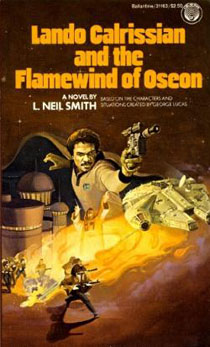The latest Star Wars Insider (No. 145) noted that libertarian writer L. Neil Smith was asked by Lucasfilm to keep politics out of his Lando Calrissian trilogy, which — as I noted in my review of “Lando Calrissian and the Mindharp of Sharu” — was an odd request considering that Lando displays the libertarian trait of being an entrepreneur wanting to operate his mining business free of government interference in “The Empire Strikes Back.”
What’s even more odd about Lucasfilm’s request is that “Star Wars” is in many ways a libertarian text, what with the way it chronicles a revolution by the people against a tyrannical, corrupt government. (Obviously, there are also pro-statism aspects to the text as well, as many stories — notably in the Marvel comics — portray planets where the people desire to have royalty rule over them. Major heroes of the saga include a queen and a princess.) Luckily though, we didn’t miss out on Smith blending a Lando adventure with libertarian concepts, because while “Mindharp of Sharu” was a bit tame, the second entry, “Lando Calrissian and the Flamewind of Oseon” (1983) has a more overt pro-liberty stance.
Once again, Lando is forced into a dangerous adventure by immoral people wielding the power of the state. On a populated asteroid in the Oseon system, Lando kills an assailant in self-defense with his stingbeam, and then contacts the authorities. He should have gone with his initial instinct to leave the body there for the authorities to find. About police officers stumbling upon bodies, Lando thinks on page 52:
They were accustomed to it, as they had every right to be. They were the ones who had made the act of self-defense a worse offense than the crime that had provoked it.
Under Oseon law, possessing a firearm (unless you’re a police officer, natch) is punishable by death.
But the asteroid’s senior administrator works out a deal with Lando: If he delivers illegal drugs to a regional crime kingpin, he’ll waive the charges. On his travels through the dangerous Flamewind, Lando is accompanied by two more officials, one of whom is Waywa Fybot, who I imagine looking like the country-lawyer chicken from “Futurama.” Fybot, too, is a victim of the state, as he really just wanted to be a chef. As the drug addict Bohhuah Mutdah tells our hero on page 145:
“I might explain that Officer Fybot has never been particularly happy in his line of work. He was conscripted to pay tribute owed by treaty by his system to the central galactic government.”
Whether the editors changed their minds about the “no politics” edict or chose not to press the issue, elements like these make “Flamewind of Oseon” a richer novel than its predecessor. Additionally, Lando’s friendship and banter with the living droid Vuffi Raa continues to be entertaining, and their time on the ship with the two officers calls to mind Brian Daley’s “Han Solo at Stars End,” especially when the mystery arises of who sabotaged Lando’s spacesuit.

Smith also delivers pulpy sci-fi elements again, including the Millennium Falcon’s journey through the Flamewind, which causes travelers to hallucinate. Also, Lando’s nemesis, Sorcerer of Tund Rokur Gepta, psychologically tortures Lando by making him feel the fear from certain moments in his life, including being misplaced by his mother when he was 3.
That short but intriguing passage got me thinking: We know the full backgrounds, parentage and origins of Luke, Leia, Han, C-3PO, Darth Vader, Boba Fett and lots of side characters. But not Lando! Maybe someday we’ll get such a story, and I think it would ideally show the shaping of Lando’s worldview, perhaps with a more down-to-Earth nemesis. I don’t think Gepta is an awful character (this web article has a different view); the way he tortures Lando is fairly ingenious as far as such things go. But I think Lando should have a less supernatural antagonist — and maybe not even an individual being — in his formative years, something like the Corporate Sector from the Han Solo books.
Until such a story arrives, “Flamewind of Oseon” is a fitting adventure for this gambler, card player and scoundrel. Unless you just can’t get past Smith’s occasional too-Earth-like reference (Lando had a dog as a youth — but then again, so did Luke, according to the “Star Wars” novelization), you’ll like it.

